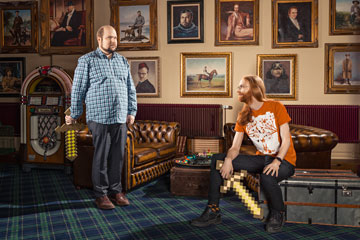
Persson, far left, and Bergensten, the minds behind Minecraft, brandishing the game's pixelated swords
(5 of 6)
Mojang's willingness to hand off oversight for key parts of the Minecraft ecosystem reflects its desire to stay small, quirky and beholden to no one. Co-founder Carl Manneh, who serves as CEO, says one of his principal responsibilities is turning down proposals from would-be investors and producers of merchandise. "In business decisions, it's easier to say yes, but I hear myself saying no all the time. With the success of Minecraft, all these doors are open to us. You have to step back and ask if it's really right for us, and usually it isn't."
The company's offices show signs of only minor splurging, like a wall covered with lavish faux-vintage portraits of staff members commissioned from a Chinese painting mill. The team can still squeeze around one unusually lengthy dining-room table, but those days can't last forever. "We're growing too fast," laments Jeb. "When I started, the plan was to be no more than 15 people. Then suddenly, no more than 25. Now we're almost 30 and looking to hire more programmers." (The industry's largest company by revenue, Activision Blizzard, has 6,700 employees.)
Mojang is expanding, cautiously, because it's getting ready to branch out beyond the game that put it on the map. Minecraft Realms, an upcoming subscription service that lets players create and explore worlds on servers provided by Mojang, will eliminate the slightly nerdy task of setting up one's own server--something players must do for now if they want to share the worlds they've built. The company is also planning to release a beta version of Scrolls, a long-awaited strategy game with card-trading elements reminiscent of Pokémon and Magic: The Gathering.
No Mojang game will inspire greater expectations than 0x10 c , Notch's current project. (He pronounces that "10 to the C" but says others are free to call it whatever they want.) The space-travel saga is set in the year A.D. 281474976712644, and he's already releasing tantalizing videos of his work in progress, just as he did when Minecraft was new. I wouldn't expect 0x10 c to show up anytime soon, though: he told me that it's going "very, very slow. I feel creatively trapped. I'm stressed out from it--it's hard to tell if the game is going to be fun."
In fact, Notch sounds nostalgic for Minecraft's earliest days. "It was easier when nobody knew who I was," he says. "Now, if I tweet a picture, millions of people scrutinize it. I'm still having fun, but I feel like I've drifted away from programming." You get the feeling that he'd at least be willing to consider exchanging his present fame and fortune for the freedom of having nothing to lose. Which is good, because success in the video-game business is usually temporary. There are no guarantees that Minecraft will be a worldwide obsession indefinitely or that the company's upcoming games will achieve even a fraction of its success.
For now, Mojang is treating its Minecraft windfall as an insurance policy that makes it, at least in the short term, indestructible. "We can pile up money from Minecraft and make games," says Notch, sounding upbeat again and perhaps just slightly boastful, "and even if they're not successful, we can still make games." To use Minecraft's language, the company is playing in Creative Mode, not Survival Mode, and it intends to keep doing so as long as it possibly can.
